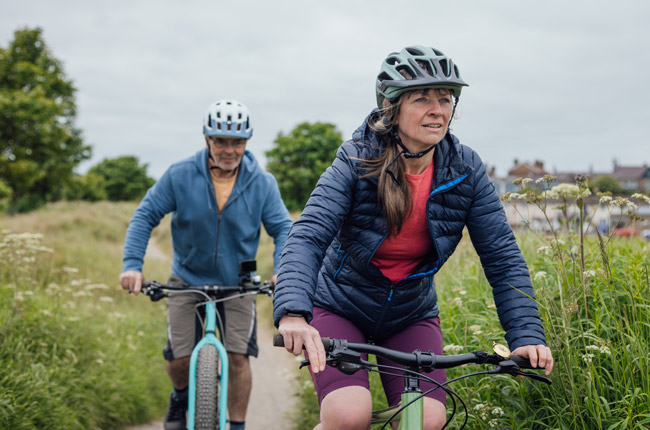Latest news and blogs

We applaud launch of 10-Year Health Plan, but there are still shortcomings
While the government’s big health announcement had some good points, we think they could do much more

New study shows benefits of physical activity for colon cancer survivors
The CO21 CHALLENGE Trial shows that exercise after colon cancer treatment resulted in longer disease-free survival

We join forces with Our Future Health to help prevent cancer across UK
World Cancer Research Fund is now an affiliate partner of Our Future Health and together we aim to unlock deeper insights into cancer prevention through data and research
More prostate cancer research
Understanding how obesity-induced tumour metabolites drive prostate cancer progression
This study aims to show that changing diet can reverse obesity-induced tumour and prostate cancer progression
Improving cognitive impairment in survivors of prostate cancer
How does physical activity, cognitive training, or a combination of the two help improve fatigue, memory and thinking in men on hormone treatment
How does physical activity lower the risk of cancer?
This research, funded by WCRF International, looks at how our genetics affect immunity, hormones and metabolism, and how these affect activity
More prostate cancer research
Vitamin D and prostate cancer
Richard Martin and his team observed an association between vitamin D and more aggressive cancers
MYEX exercise trial for patients with prostate cancer
Investigating tumour suppressive biological mechanisms is important in clinical oncology to expand exercise medicine and further confirm the prescription of exercise as essential for cancer patients.
Obesity, exercise and prostate cancer
This study, funded by WCRF International, aims to investigate why obesity makes prostate cancer more aggressive
More prostate cancer research
Do vegetarian diets lower cancer risk?
This research found that vegetarians had a reduced risk of cancers of the gastrointestinal tract
Impact of sleep on the development of reproductive system cancers
This INSPIRE project will use data from the UK Biobank and genome-wide association studies to examine the relationship between sleep habits, sleep medications, and the risk of prostate and endometrial cancers
Dairy and plant foods, and advanced prostate cancer
Calcium, fruit and vegetable intakes were not associated with risk of advanced prostate cancer in this research
More prostate cancer research
Chronic platelet activation – a major link between diet, lifestyle and cancer risk?
We’re funding the first comprehensive prospective study on chronic platelet activation in healthy subjects and subsequent cancer risk
Does the age you are obese matter?
Obesity is associated with an increased risk of death from prostate cancer, but the underlying causes are poorly understood
Do vegetarian diets lower cancer risk?
This research found that vegetarians had a reduced risk of cancers of the gastrointestinal tract
More prostate cancer research
Chronic platelet activation – a major link between diet, lifestyle and cancer risk?
We’re funding the first comprehensive prospective study on chronic platelet activation in healthy subjects and subsequent cancer risk
Identifying which nutrients may cause or protect against prostate cancer
Our research hypothesises that folate, vitamin B12, & iron may increase cancer risk; selenium, vitamin D, E & lycopene may protect against
How does physical activity lower the risk of cancer?
This research, funded by WCRF International, looks at how our genetics affect immunity, hormones and metabolism, and how these affect activity
More prostate cancer research
Do vegetarian diets lower cancer risk?
This research found that vegetarians had a reduced risk of cancers of the gastrointestinal tract
Vitamin D and prostate cancer
Richard Martin and his team observed an association between vitamin D and more aggressive cancers
Impact of sleep on the development of reproductive system cancers
This INSPIRE project will use data from the UK Biobank and genome-wide association studies to examine the relationship between sleep habits, sleep medications, and the risk of prostate and endometrial cancers
Latest research-related news and blogs

New study shows benefits of physical activity for colon cancer survivors
The CO21 CHALLENGE Trial shows that exercise after colon cancer treatment resulted in longer disease-free survival

Why is alcohol so popular among older drinkers while young people cut back?
Alcohol is a way of life in societies around the world – yet there are signs of change as young adults are drinking less than previous generations. We spoke to Prof Richard Cooke about the psychology of drinking alcohol

Were you part of the Women’s Cohort Study?
This year marks the 30th anniversary of the UK Women’s Cohort Study, the initial funding for which came from us
Latest research-related news and blogs

New study shows benefits of physical activity for colon cancer survivors
The CO21 CHALLENGE Trial shows that exercise after colon cancer treatment resulted in longer disease-free survival

Why is alcohol so popular among older drinkers while young people cut back?
Alcohol is a way of life in societies around the world – yet there are signs of change as young adults are drinking less than previous generations. We spoke to Prof Richard Cooke about the psychology of drinking alcohol

Were you part of the Women’s Cohort Study?
This year marks the 30th anniversary of the UK Women’s Cohort Study, the initial funding for which came from us
Latest research news and blogs

New study shows benefits of physical activity for colon cancer survivors
The CO21 CHALLENGE Trial shows that exercise after colon cancer treatment resulted in longer disease-free survival

Why is alcohol so popular among older drinkers while young people cut back?
Alcohol is a way of life in societies around the world – yet there are signs of change as young adults are drinking less than previous generations. We spoke to Prof Richard Cooke about the psychology of drinking alcohol

Were you part of the Women’s Cohort Study?
This year marks the 30th anniversary of the UK Women’s Cohort Study, the initial funding for which came from us
Latest research-related news and blogs

New study shows benefits of physical activity for colon cancer survivors
The CO21 CHALLENGE Trial shows that exercise after colon cancer treatment resulted in longer disease-free survival

Why is alcohol so popular among older drinkers while young people cut back?
Alcohol is a way of life in societies around the world – yet there are signs of change as young adults are drinking less than previous generations. We spoke to Prof Richard Cooke about the psychology of drinking alcohol

Were you part of the Women’s Cohort Study?
This year marks the 30th anniversary of the UK Women’s Cohort Study, the initial funding for which came from us
Latest research-related news and blogs

New study shows benefits of physical activity for colon cancer survivors
The CO21 CHALLENGE Trial shows that exercise after colon cancer treatment resulted in longer disease-free survival

Why is alcohol so popular among older drinkers while young people cut back?
Alcohol is a way of life in societies around the world – yet there are signs of change as young adults are drinking less than previous generations. We spoke to Prof Richard Cooke about the psychology of drinking alcohol

Were you part of the Women’s Cohort Study?
This year marks the 30th anniversary of the UK Women’s Cohort Study, the initial funding for which came from us